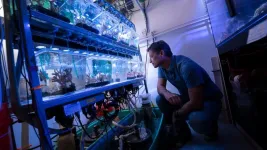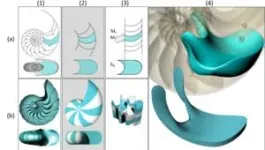SEATTLE, WASH.—September 10, 2024—Climate change is rapidly reshaping our oceans, stressing the nervous systems of marine organisms that have evolved over millions of years. Scientists now face a critical question: How do these environmental shifts affect these animals’ ability to sense and respond to their changing world?
To address this pressing issue, the Paul G. Allen Frontiers Group, a division of the Allen Institute, today announced the launch of the Allen Discovery Center (ADC) for Neurobiology in Changing Environments. This initiative, based at Scripps Institution of Oceanography at the University of California San Diego (UCSD), will investigate the impacts of climate change on marine animals’ nervous systems and behaviors.
The research center is funded at $10 million over four years by the Paul G. Allen Family Foundation, with a total potential for $20 million over eight years.
“Understanding the broader impacts of climate change on life will inform new ways of responding and adapting to these changes,” said Rui Costa, Ph.D., D.V.M., President and Chief Executive Officer of the Allen Institute. “The frontier science of the Allen Discovery Center for Neurobiology in Changing Environments is poised to unlock insights into how the living world is affected by environmental change and adapts. This knowledge is key to building resilience to an ever-changing planet and a better future for those on it.”
The center’s research will be directed by Martin Tresguerres, Ph.D., a professor of marine biology at Scripps, along with co-lead principal investigators Amro Hamdoun, Ph.D., and Deirdre Lyons, Ph.D.
They will lead a diverse team of researchers from UCSD, the University of Southern California, the Carnegie Institution, the University of Virginia, and MacEwan University. Together they will investigate how climate change affects the neurobiology of four marine species: staghorn coral, slipper snail, painted sea urchin, and three-spined stickleback fish, chosen for their diverse evolutionary lineages and ecological importance.
The research will combine cutting-edge genetic approaches with physiological and behavioral experiments, both in the laboratory and in the field. Key objectives include developing neural maps for each species, examining environmental impacts on behavior and sensory perception, and identifying genetic variations that may aid adaptation to changing oceans.
Understanding how neural systems are impacted by—or resilient to—changes in natural environments is crucial, said Tresguerres, the center's lead investigator.
"Our research aims to identify the mechanisms behind resilience or vulnerability in different species and populations as they face rapidly changing ocean conditions," he said. "This knowledge is crucial for predicting and potentially mitigating the impacts of climate change on marine ecosystems."
Uncovering that knowledge requires a multidisciplinary approach, stressed Hamdoun, co-lead principal investigator.
“This grant is unique because it unites experts from diverse fields to create something entirely new, rather than just deepening their existing expertise,” he said. “In a center like this, we’re bringing together expertise that typically doesn’t intersect. Imagine researchers on an ocean vessel collaborating with people who would normally be working within a medical school.”
Lyons emphasized the need for a comprehensive strategy to tackle the challenges posed by rapid environmental changes. “It’s crucial to adopt an integrated, multispecies approach to understand how genomes and their unfurling into living organisms are affected by rapid environmental changes," she said. "We need to quickly identify which parts of the genome are most impacted by these changes.”
The Allen Discovery Center for Neurobiology in Changing Environments is also committed to sharing its findings with the global research community, training the next generation of scientists, and engaging the public through partnerships with the Birch Aquarium at Scripps.
"The lens of climate change is entirely new for the Frontiers Group, and the timely work of the Allen Discovery Center is critical to understanding the consequences of the climate crisis on the nervous system and to identify potential mechanisms of resilience and adaptation,” said Kathryn Richmond, Ph.D., M.B.A., executive vice president and director of the Frontiers Group. “The team’s commitment to disseminating their discoveries both within the scientific community and the public is a tremendous benefit and will enhance and expand the lasting impact of this important work."
In 2025, Research Corporation for Science Advancement, The Paul G. Allen sFrontiers Group, and The Kavli Foundation will launch a Scialog initiative to catalyze research to explore neurobiological response to change and advance our understanding of the brain's chemistry, physiology, and adaptation mechanisms. Learn more.
About The Paul G. Allen Frontiers Group
The Paul G. Allen Frontiers Group, a division of the Allen Institute, is dedicated to exploring the landscape of bioscience to identify and foster ideas that will change the world. The Frontiers Group recommends funding to the Paul G. Allen Family Foundation, which then invests through award mechanisms to accelerate our understanding of biology, including: Allen Discovery Centers at partner institutions for leadership-driven, compass-guided research; and Allen Distinguished Investigators for frontier explorations with exceptional creativity and potential impact. The Paul G. Allen Frontiers Group was founded in 2016 by the late philanthropist and visionary Paul G. Allen. For more information, visit alleninstitute.org/division/frontiers-group/
About the Scripps Institution of Oceanography
Scripps Institution of Oceanography at the University of California San Diego is one of the world’s most important centers for global earth science research and education. In its second century of discovery, Scripps scientists work to understand and protect the planet, and investigate our oceans, Earth, and atmosphere to find solutions to our greatest environmental challenges. Scripps offers unparalleled education and training for the next generation of scientific and environmental leaders through its undergraduate, master’s and doctoral programs. The institution also operates a fleet of four oceanographic research vessels, and is home to Birch Aquarium at Scripps, the public exploration center that welcomes 500,000 visitors each year.
# # #
Media Contact
Peter Kim, Sr. Manager, Media Relations
peter.kim@alleninstitute.org
END





